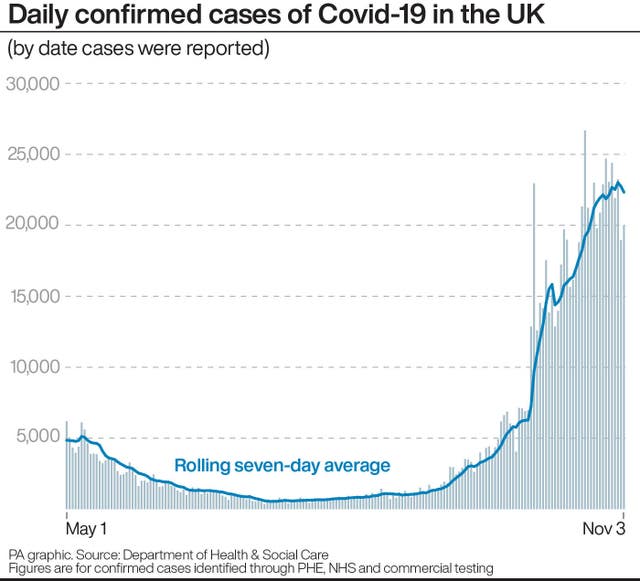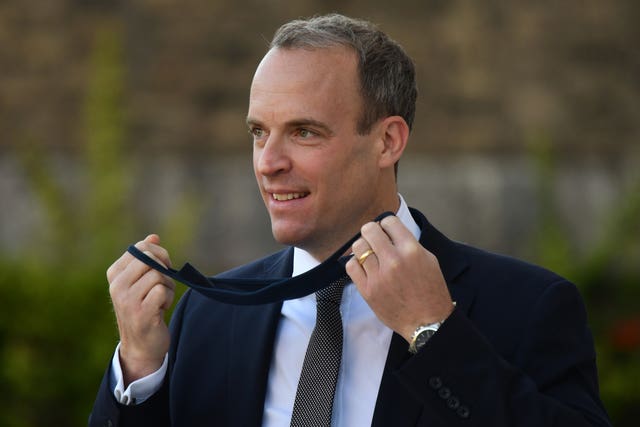
There are “22 hospitals’ worth” of coronavirus patients in hospitals in England, the head of the NHS has said.
Sir Simon Stevens, chief executive of the NHS in England, said there had been a “very substantial” increase in “desperately sick patients in hospitals” in October.
It comes as MPs prepare to vote on a new four-week coronavirus lockdown for England amid warnings the NHS will be overwhelmed with thousands more deaths unless action is taken.
With Labour backing the new restrictions, which are due to come into force on Thursday, the Government is expected to comfortably win Wednesday’s Commons vote – despite a number of Tory rebels saying they would vote against the restrictions.
Sir Simon said that the actions taken by Parliament would mean that the health service should be able to avoid postponing routine operations.
He also said that the NHS would be “geared up” to start delivering any potential Covid vaccine before Christmas.
And he suggested that all patient-facing NHS staff would soon be given routine testing, regardless of symptoms.

Sir Simon told BBC Radio 4’s Today programme: “We began early September with under 500 coronavirus patients in hospitals.
“By the beginning of October that had become 2,000. As of today that is just under 11,000.
“So, put another way, we’ve got 22 hospitals’ worth of coronavirus patients across England.
“And indeed, even since Saturday, when the Prime Minister gave his press conference, we filled another two hospitals full of severely ill coronavirus patients.”
He added: “In many parts of the country we’re now seeing more coronavirus inpatients in hospital and in intensive care than we saw in the first peak in April.”
Sir Simon said the NHS wants to “minimise” coronavirus “spiralling out of control” so other services are not disrupted.
He said health service did not run out of critical care capacity during the first wave, adding: “We fully expect that will continue to be the case, and indeed the action Parliament is considering today will mean not only that, but should mean that we will not need to embark on a national deferral of routine operations across the country and instead will continue with targeted local decisions based on the particular pressures individual hospitals and geographies are facing.”
But he said that the NHS was “gearing up” to deliver a Covid-19 vaccine should one become available before the end of the year.
On a potential Covid vaccine, Sir Simon added: “There are over 200 vaccines in development and we believe that we should hopefully get one or more of those available from the first part of next year.
“In anticipation of that we’re also gearing the NHS up to be ready to make a start on administering Covid vaccines before Christmas, if they become available.
“We reached an agreement with GPs to ensure they will be doing that, and we’ll be writing to GP practices this week to get them geared up to start by Christmas if the vaccine becomes available.”
Prime Minister Boris Johnson is facing a revolt by some Tory backbenchers angry at the impact on civil liberties and the economic damage the measures will cause.
It is thought about 15 Conservative MPs could defy the whips and vote against the new controls – although the parliamentary arithmetic means their rebellion is likely to be largely symbolic.
In the latest sign of Tory unrest about the lockdown, former chief whip Mark Harper said he would join the rebels in the Commons later.
“I do not believe that the Government has made the case for a change away from the tiered system and in favour of an England-wide national lockdown,” he wrote on the ConservativeHome website.
“The published information also confirms that the modelling has not taken into account the introduction of the system of Medium, High and Very High tiers. It is clear that the Government has not given this strategy enough time to demonstrate whether or not it was effective.”

But Foreign Secretary Dominic Raab said the second national lockdown in England had been ordered “reluctantly” and stressed that the economic implications had been considered.
The Cabinet minister denied that the Government had used a “doomsday scenario” and “highly selective” data in its modelling of the second wave’s impact when justifying the second lockdown on Saturday.
Asked on LBC radio whether people in England could mark the date of the end of the second national lockdown on their calendars, he said: “Put it in your diary, it is written into law.”
He added: “We didn’t want to do it, we’ve reluctantly done it as a last resort, and come December 2 we will revert to the tailored geographically-targeted approach because economically that is less painful.”
Ahead of the Commons vote, Mr Johnson warned of “fatalities running in the thousands” if no action was taken as cases across the country continued to rise.
At the same time he sought to offer hope, telling Tuesday’s Cabinet meeting that the R number – the reproduction rate of the virus – was “only just above 1” and the new measures would bring it back below that threshold.
When the firebreak ends on 9 November, new national measures will come into effect.
These measures will enable aspects of life to resume gradually, but the virus has not gone away.
For now, please stay home to save lives.
Together, we will #KeepWalesSafe. pic.twitter.com/B5uTtcNtpj
— Welsh Labour (@WelshLabour) November 3, 2020
Unlike the last national lockdown in March, schools and colleges will remain open under the new controls, which are due to run to December 2.
However, pubs and restaurants will be forced to close, except for takeaways and deliveries, as will gyms, entertainment venues and non-essential shops.
People will be banned from socialising with other households indoors, and only allowed to meet one other person from another household outdoors.
There has been criticism, however, over rules which mean children’s grassroots sports will be banned outside school settings.
Some Tories have also hit out at a ban on communal worship, which has meant church services marking Remembrance Sunday have had to be cancelled.

The latest Government figures showed that a further 397 people had died within 28 days of testing positive for Covid-19 as of Tuesday, bringing the UK total to 47,250, while there were a further 20,018 lab-confirmed cases of the disease.
Ministers hope that when the restrictions are lifted the Government will be able to return to a tiered series of localised restrictions for England, depending on the infection rate in a particular area.
Welsh First Minister Mark Drakeford has, however, said the lockdown will mean the hardest border between England and Wales for “several centuries at least”, with travel between the two countries banned without reasonable excuse.
The controls are set to come into force just as Wales prepares to end its two-and-a-half week “firebreak”, with schools, shops, pubs and restaurants set to reopen from Monday.


Comments: Our rules
We want our comments to be a lively and valuable part of our community - a place where readers can debate and engage with the most important local issues. The ability to comment on our stories is a privilege, not a right, however, and that privilege may be withdrawn if it is abused or misused.
Please report any comments that break our rules.
Read the rules hereLast Updated:
Report this comment Cancel